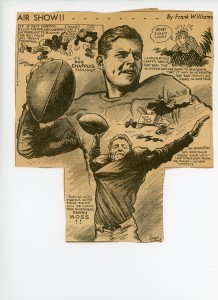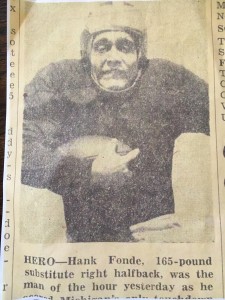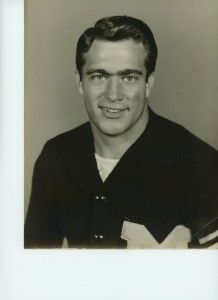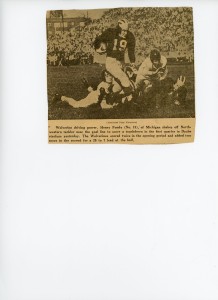The last game of the University of Michigan football season is normally played against perennial rival Ohio State University. Due to the pandemic, the Michigan-Ohio State game scheduled for Saturday, December 12, 2020, was cancelled. All the more reason to commemorate the non-event with a new version of my essay celebrating the Michigan-Ohio State game that was played 75 years ago.
“I BEAT OHIO STATE!”
By Joel Thurtell
The 80-year-old guy with the shock of white hair wore a fading maize and blue University of Michigan t-shirt. But this old man was not just any Michigan fan. Nor was it just any UM t-shirt. The woman, maybe in her fifties, quite evidently from Ohio, didn’t know either of these things. And neither I nor my two sons who were listening knew the story behind a clue this old man was about to reveal to us. I would not piece the story together for several years, even though I’d known this onetime Michigan football player and coach for more than three decades and was married to his oldest daughter for forty years.
The conversation — if you can call it that — took place in summer 2003 near the dock at J & G Marina on McGregor Bay in Ontario, a few miles by water from an island where this old man and his family had a summer cottage bought in the mid-1960s, when he was a UM football coach, second-in-command under another well-known Michigan player and coach, Bump Elliott.
The Ohio woman spotted the yellow and blue t-shirt with the UM logo and some script she didn’t understand. The shirt was a gift from UM to Hank and those 1948 team-mates still living at the time Michigan won the Rose Bowl game on January 1, 1998. The shirt commemorated two Rose Bowl victories and two National championships 50 years apart. Hank was a member of that New Year’s Day 1948 UM team that blew the University of Southern California away. The score was Michigan 49, USC 0.
The program for the October 4, 1947 Michigan-Stanford game described “diminutive ‘Hank,’ stout-hearted little speedster from Knoxville, Tenn., weighed about 150 pounds when he flung his compact frame against Army’s giants in 1945 at Yankee Stadium. Army players dubbed him ‘hardest to stop.’ He weighs about ten pounds more now and still is hard to stop. He scored thrice in 1945, averaging 4.1 yards per game, and last year he scored two touchdowns and averaged 3.23. He’s 23 and five-eight.” Michigan coach Bennie Osterbaan said Hank was “the best back, pound for pound, I’ve ever had.”
The Ohio woman didn’t know this. When her eyes detected blue, her brain saw red. All she knew was that this old man was wearing a t-shirt belonging to the enemy, the hated University of Michigan. She was an Ohio State fan. An easily perturbed Ohio State fan (aren’t they all?). Had she stopped to learn who this old man was, she might have heard an interesting story. But the ending of that story would have perturbed her even more.
My sons and I watched the Ohio woman, unforgettable because she came on so angry, so full of bile, so hostile to an old man who had said nothing to offend her. Hank could not respond round for round to this woman’s incessant, nasty volleys. Hank had Alzheimer’s Disease. His memory had long been gone for the people, places, things and events that once were dear to him.
But I knew who Hank was and I could have told her some phenomenal things about him. Most of it has nothing to do with football. Why, it was Hank who took me fishing in McGregor Bay and put us over the best bass and pike grounds. It was Hank who coached me to filet a bass or pike. It was Hank who helped me with the summer-long project of replacing the porch roof on our first house in Plymouth. I can hear him still: “Measure twice, cut once,” or he would declare, “level and half a bubble over!”
Hank loved language. His father, who played football for the University of Tennessee, was a poet. Hank did not write poetry, but he had a way of using language that is unforgettable. When he shook your hand, he would say, “Put ‘er there for ninety days!” If you dropped something or made a loud noise, Hank would shout, “Shoot him in the pants! The coat and vest belong to me!” If you were a tall person, he’d tell you, “It’s a long drink of water.” If you cut a fart, he’d say, “Who fired that shot?”
“Some low-down, dirty, good-for-nothin’, thievin’, cussin’, cattle-rustlin’ dirty dawwwg…put GLUE ON MY SADDLE!”
Edith, his wife, asked him, “Henry, does this dress make me look fat?” *
Hank replied, “No,…It’s the fat that makes you look fat.”
He had special nicknames for his kids. Karen was “tin can cottontail the cottontail that willy wag.”
Mark was “Marcus Aurelius Vestpocket Pucius.”
Looking forward to some event, Hank would say, “the good lord willin’ and the creek don’t rise.”
Hank was proud to hail “from the hills of East Tennessee, home of Andrew Jackson, Andrew Johnson, Cordell Hull, Jellybean Birchfield and other great American statesmen.”
(I’ve posted a collection of Hank’s sayings on my blog, joelontheroad.com.)
Football was an undying love — even with Alzheimer’s he could correctly call a play. Hank was a high school star in his hometown of Knoxville, where his team once stood four other teams in succession, playing fresh teams a quarter apiece. Hank played something called “scatback,” and helped Knoxville knock off all four teams.
“Seven Touchdowns in January” is a movie of that January 1, 1948 Rose Bowl game. On the screen you can see a small but agile halfback — Hank — scooting around Southern Cal players and lofting the football to a Michigan player for one of those seven touchdowns.

This cartoon probably ran in 1947 and mentions the notable University of Michigan players, including HANK FONDE.
For 10 years in the 1950s, Hank was head football coach at Ann Arbor High School, from 1949-58. In his first eight years, his team lost one game. They won two state championships. His overall record was 69 wins, six losses and four ties. Four of the losses occurred his last year, when he and his players knew he was leaving to coach at UM. From 1959-68, Hank coached at UM under Bump Elliott. With Hank coaching defense and backs, Michigan won the Jan. 1, 1965 Rose Bowl game against Oregon State, 34-7. The two Michigan coaches in 1965 – Bump Elliott and Hank Fonde – were players on a victorious Rose Bowl team and later coached a team that won the Rose Bowl.
Back to that dockside rant in Canada. Here was this Ohio woman coming on with her nasty, Michigan-bashing comments, taunting an old man who would get lost in the middle of his sentences as he strove to find a word that eluded him.
Yet the Ohio woman wore on, making her crude remarks, getting no response from the old man in the maize and blue t-shirt.
Despite the Alzheimer’s, somehow Hank understood the gist of what the Ohio woman was saying.
As she paused for breath, Hank at last found words.
Amazingly, he put together a sentence rooted in a core memory, a recollection that even the brutal Alzheimer’s could not erase.
“I BEAT OHIO STATE!”
It was amazing to hear him utter a complete sentence, and to do it with such sternness, such authority.
The Ohio woman looked at Hank as if she finally understood that this old man was demented.
I have to admit, his comment puzzled me.
The Ohio woman went silent.
I thought about it: “I BEAT OHIO STATE!”
What could Hank have meant?
The Ohio woman drifted away, maybe looking for her next victim, one with a green Michigan State shirt.
Several years later, I was visiting Hank’s son, my brother-in-law, Mark Fonde. Mark had one of the footballs Hank was given after games when he made crucial plays. The football is faded, worn and deflated. Hand-painted on one side, it says, “Michigan 7, Ohio 3.”
I asked Mark, “What does it mean?”
Mark said it was 1945, the last game of the season, and Michigan was, as usual, facing arch-rival Ohio State. World War II had only recently come to an end. This was a wartime team. Thirteen players, including Hank, were Navy trainees. Four were Marines. Four were discharged veterans. Michigan’s coach was the legendary Fritz Crisler, and the teams were called the “mad magicians” because it often was hard to tell exactly what they were doing when they drove for touchdowns.

HERO—-Hank Fonde, 165-pound substitute right halfback, was the man of the hour yesterday as he scored Michigan’s only touchdown against Ohio State…The Michigan Daily, November 25, 1945
In his book The Big One about the Michigan-Ohio State rivalry, Bill Chromartie wrote that Ohio scored a field goal for 3 points in the third quarter. The score stayed 0-3 until the last quarter. With eleven minutes remaining, Pete Elliott (Bump’s brother) threw a 25-yard pass to Hank at Ohio’s 19-yard-line. In two plays, Elliott brought the ball to the 10. Elliott was stopped on the next play. Fourth down, one yard for first down. The 85,132 fans in Michigan Stadium were on their feet. Hank crashed the Ohio line and took the ball five yards for the first down. Ohio was off sides on the next play. Penalty. The ball was on the one-yard line. Hank crashed into the end zone. The extra point was good. Final score: Michigan 7, Ohio 3.
The next day’s Michigan Daily headlined
Wolverines Beat Buckeyes, 7-3, in Finale
Fonde’s Fourth Quarter Score Decides Contest
According to Mark, Hank was knocked out during that play. He came to in the locker room, and someone handed him the ball.
Years later, I mentioned the Ohio State story to my older son, Adam. He reminded me of what granddad said to the Ohio woman.
Thanks to the Ohio woman, I understand what Hank meant when he told us, “I BEAT OHIO STATE!”
Drop me a line at joelthurtell(at)gmail.com
*Edith Fonde died in 2007; Hank Fonde died in 2009; Mark Fonde died February 28, 2015, one week before his older sister and my wife, Karen Fonde, died on March 1, 2015.

